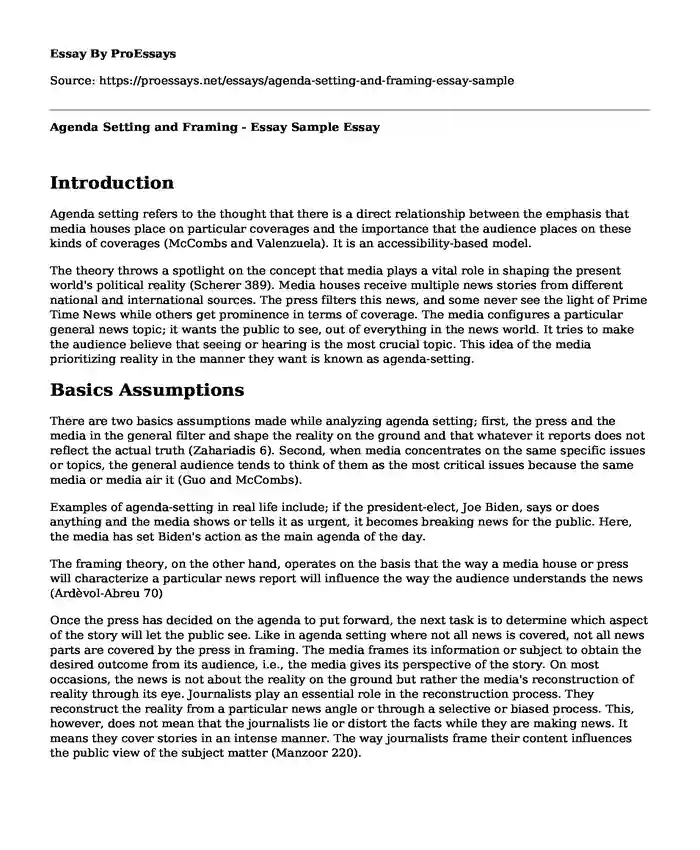Introduction
Agenda setting refers to the thought that there is a direct relationship between the emphasis that media houses place on particular coverages and the importance that the audience places on these kinds of coverages (McCombs and Valenzuela). It is an accessibility-based model.
The theory throws a spotlight on the concept that media plays a vital role in shaping the present world's political reality (Scherer 389). Media houses receive multiple news stories from different national and international sources. The press filters this news, and some never see the light of Prime Time News while others get prominence in terms of coverage. The media configures a particular general news topic; it wants the public to see, out of everything in the news world. It tries to make the audience believe that seeing or hearing is the most crucial topic. This idea of the media prioritizing reality in the manner they want is known as agenda-setting.
Basics Assumptions
There are two basics assumptions made while analyzing agenda setting; first, the press and the media in the general filter and shape the reality on the ground and that whatever it reports does not reflect the actual truth (Zahariadis 6). Second, when media concentrates on the same specific issues or topics, the general audience tends to think of them as the most critical issues because the same media or media air it (Guo and McCombs).
Examples of agenda-setting in real life include; if the president-elect, Joe Biden, says or does anything and the media shows or tells it as urgent, it becomes breaking news for the public. Here, the media has set Biden's action as the main agenda of the day.
The framing theory, on the other hand, operates on the basis that the way a media house or press will characterize a particular news report will influence the way the audience understands the news (Ardèvol-Abreu 70)
Once the press has decided on the agenda to put forward, the next task is to determine which aspect of the story will let the public see. Like in agenda setting where not all news is covered, not all news parts are covered by the press in framing. The media frames its information or subject to obtain the desired outcome from its audience, i.e., the media gives its perspective of the story. On most occasions, the news is not about the reality on the ground but rather the media's reconstruction of reality through its eye. Journalists play an essential role in the reconstruction process. They reconstruct the reality from a particular news angle or through a selective or biased process. This, however, does not mean that the journalists lie or distort the facts while they are making news. It means they cover stories in an intense manner. The way journalists frame their content influences the public view of the subject matter (Manzoor 220).
Conclusion
Instances of framing in the real world include; a subject like a drug issue can be framed differently to bring out different views; the drug misuse can be framed as a social issue; it may be framed as a health and a law and order issue. In some instances, it can be framed to advocate for the legalization of drug consumption.
Works Cited
Ardèvol-Abreu, A. "Framing Theory in Communication Research. Origins, Development and Current Situation in Spain." Revista Latina De Comunicación Social, no. 70, 2015, pp. 423–450., doi:10.4185/rlcs-2015-1053en.
Guo, Lei, and McCombs Maxwell. The Power of Information Networks: New Directions for Agenda Setting. Routledge, 2016.
Manzoor, Samia. "Application of Agenda-Setting, Framing and Propaganda during News Production Process." Pakistan Social Sciences Review, vol. 3, no. II, 2019, pp. 213–228., doi:10.35484/pssr.2019(3-ii)17.
McCombs, Maxwell, and Valenzuela Sebastian. Setting the Agenda: Mass Media and Public Opinion. John Wiley & Sons, 2020.
Scherer, Andreas Georg. "Theory Assessment and Agenda Setting in Political CSR: A Critical Theory Perspective." International Journal of Management Reviews, vol. 20, no. 2, 2017, pp. 387–410., doi:10.1111/ijmr.12137.
Zahariadis, Nikolaos. "Setting the Agenda on Agenda Setting: Definitions, Concepts, and Controversies." Handbook of Public Policy Agenda Setting, by Nikolaos Zahariadis, Edward Elgar Publishing, 2016, pp. 1–21.
Cite this page
Agenda Setting and Framing - Essay Sample. (2024, Jan 10). Retrieved from https://proessays.net/essays/agenda-setting-and-framing-essay-sample
If you are the original author of this essay and no longer wish to have it published on the ProEssays website, please click below to request its removal:
- Paper Sample on A Streetcar Named Desire
- Paper Example on Racism and Representation of Women in Hollywood Films
- Innovations in Social Investments and its Future, Essay Example
- Social Commentary Song "Just Imagine" by John Lenon
- Shining Hope: Empowering Communities Through Jessica Posner & Kennedy Odede's Story - Essay Sample
- Essay on Numerical Study of Stainless Steel Columns Under Transverse Impact Load
- Parental Control And Full Freedom - Free Essay Sample







